Jurgen (16)
By:
June 27, 2015
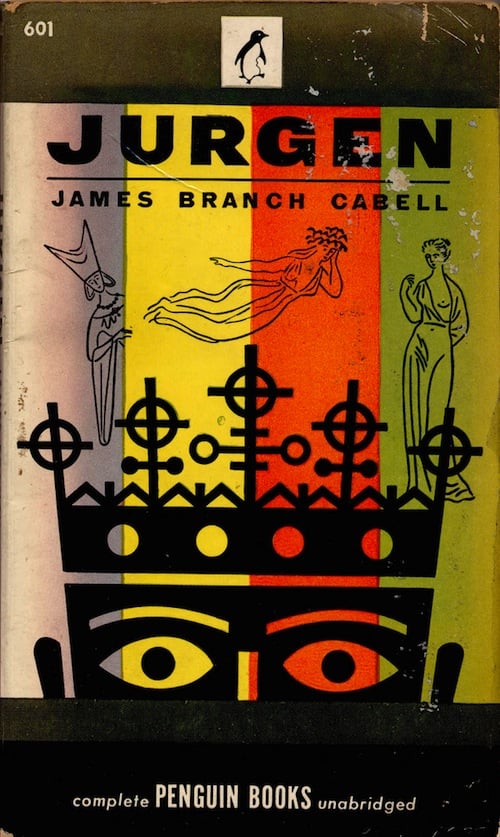
James Branch Cabell’s 1919 ironic fantasy novel Jurgen, A Comedy of Justice, the protagonist of which seduces women everywhere he travels — including into Arthurian legend and Hell itself — is (according to Aleister Crowley) one of the “epoch-making masterpieces of philosophy.” Cabell’s sardonic inversion of romantic fantasy was postmodernist avant la lettre. HiLoBooks is pleased to serialize Jurgen here at HILOBROW. Enjoy!
The tale records that it was not a great while before, in simple justice to Guenevere, Duke Jurgen had afforded her the advantage of frank conversation in actual privacy. For conventions have to be regarded, of course. Thus the time of a princess is not her own, and at any hour of day all sorts of people are apt to request an audience just when some most improving conversation is progressing famously: but the Hall of Judgment stood vacant and unguarded at night.
“But I would never consider doing such a thing,” said Guenevere: “and whatever must you think of me, to make such a proposal!”
“That too, my dearest, is a matter which I can only explain in private.”
“And if I were to report your insolence to my father —”
“You would annoy him exceedingly: and from such griefs it is our duty to shield the aged.”
“And besides, I am afraid.”
“Oh, my dearest,” says Jurgen, and his voice quavered, because his love and his sorrow seemed very great to him: “but, oh, my dearest, can it be that you have not faith in me! For with all my body and soul I love you, as I have loved you ever since I first raised your face between my hands, and understood that I had never before known beauty. Indeed, I love you as, I think, no man has ever loved any woman that lived in the long time that is gone, for my love is worship, and no less. The touch of your hand sets me to trembling, dear; and the look of your gray eyes makes me forget there is anything of pain or grief or evil anywhere: for you are the loveliest thing God ever made, with joy in the new skill that had come to His fingers. And you have not faith in me!”
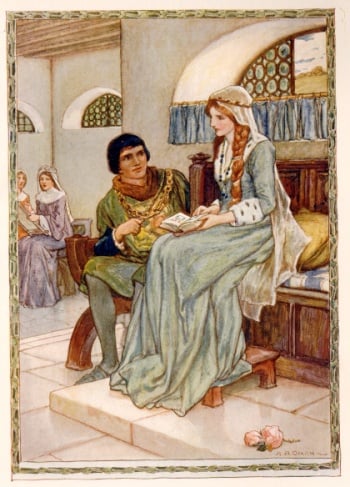
Then the Princess gave a little sobbing laugh of content and repentance, and she clasped the hand of her grief-stricken lover. “Forgive me, Jurgen, for I cannot bear to see you so unhappy!”
“Ah, and what is my grief to you!” he asks of her, bitterly.
“Much, oh, very much, my dear!” she whispered.
So in the upshot Jurgen was never to forget that moment wherein he waited behind the door, and through the crack between the half-open door and the door-frame saw Guenevere approach irresolutely, a wavering white blur in the dark corridor. She came to talk with him where they would not be bothered with interruptions: but she came delightfully perfumed, in her night-shift, and in nothing else. Jurgen wondered at the way of these women even as his arms went about her in the gloom. He remembered always the feel of that warm and slender and yielding body, naked under the thin fabric of the shift, as his arms first went about her: of all their moments together that last breathless minute before either of them had spoken stayed in his memory as the most perfect.
And yet what followed was pleasant enough, for now it was to the wide and softly cushioned throne of a king, no less, that Guenevere and Jurgen resorted, so as to talk where they would not be bothered with interruptions. The throne of Gogyrvan was perfectly dark, under its canopy, in the unlighted hall, and in the dark nobody can see what happens.
Thereafter these two contrived to talk together nightly upon the throne of Glathion: but what remained in Jurgen’s memory was that last moment behind the door, and the six tall windows upon the east side of the hall, those windows which were of commingled blue and silver, but were all an opulent glitter, throughout that time in the night when the moon was clear of the tree-tops and had not yet risen high enough to be shut off by the eaves. For that was all which Jurgen really saw in the Hall of Judgment. There would be a brief period wherein upon the floor beneath each window would show a narrow quadrangle of moonlight: but the windows were set in a wall so deep that this soon passed. On the west side were six windows also, but about these was a porch; so no light ever came from the west.
Thus in the dark they would laugh and talk with lowered voices. Jurgen came to these encounters well primed with wine, and in consequence, as he quite comprehended, talked like an angel, without confining himself exclusively to celestial topics. He was often delighted by his own brilliance, and it seemed to him a pity there was no one handy to take it down: so much of his talking was necessarily just a little over the head of any girl, however beautiful and adorable.
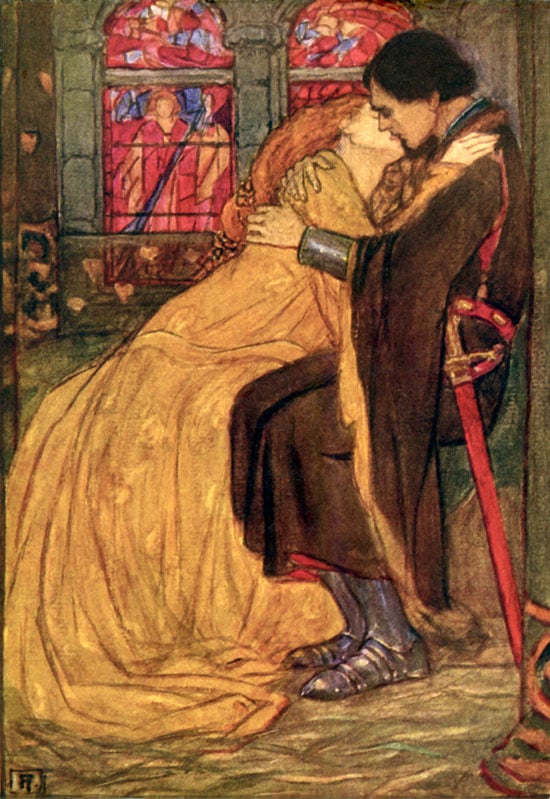
And Guenevere, he found, talked infinitely better at night. It was not altogether the wine which made him think that, either: the girl displayed a side she veiled in the day time. A girl, far less a princess, is not supposed to know more than agrees with a man’s notion of maidenly ignorance, she contended.
“Nobody ever told me anything about so many interesting matters. Why, I remember —” And Guenevere narrated a quaintly pathetic little story, here irrelevant, of what had befallen her some three or four years earlier. “My mother was living then: but she had never said a word about such things, and frightened as I was, I did not go to her.”
Jurgen asked questions.
“Why, yes. There was nothing else to do. I cannot talk freely with my maids and ladies even now. I cannot question them, that is: of course I can listen as they talk among themselves. For me to do more would be unbecoming in a princess. And I wonder quietly about so many things!” She educed instances. “After that I used to notice the animals and the poultry. So I worked out problems for myself, after a fashion. But nobody ever told me anything directly.”
“Yet I dare say that Thragnar — well, the Troll King, being very wise, must have made zoology much clearer.”
“Thragnar was a skilled enchanter,” says a demure voice in the dark; “and through the potency of his abominable arts, I can remember nothing whatever about Thragnar.”
Jurgen laughed, ruefully. Still, he was tolerably sure about Thragnar now.
So they talked: and Jurgen marvelled, as millions of men had done aforetime, and have done since, at the girl’s eagerness, now that barriers were down, to discuss in considerable detail all such matters as etiquette had previously compelled them to ignore. About her ladies in waiting, for example, she afforded him some very curious data: and concerning men in general she asked innumerable questions that Jurgen found delicious.
Such innocence combined — upon the whole — with a certain moral obtuseness, seemed inconceivable. For to Jurgen it now appeared that Guenevere was behaving with not quite the decorum which might fairly be expected of a princess. Contrition, at least, one might have looked for, over this hole and corner business: whereas it worried him to note that Guenevere was coming to accept affairs almost as a matter of course. Certainly she did not seem to think at all of any wickedness anywhere: the utmost she suggested was the necessity of being very careful. And while she never contradicted him in these private conversations, and submitted in everything to his judgment, her motive now appeared to be hardly more than a wish to please him. It was almost as though she were humoring him in his foolishness. And all this within six weeks! reflected Jurgen: and he nibbled his finger-nails, with a mental side-glance toward the opinions of King Gogyrvan Gawr.
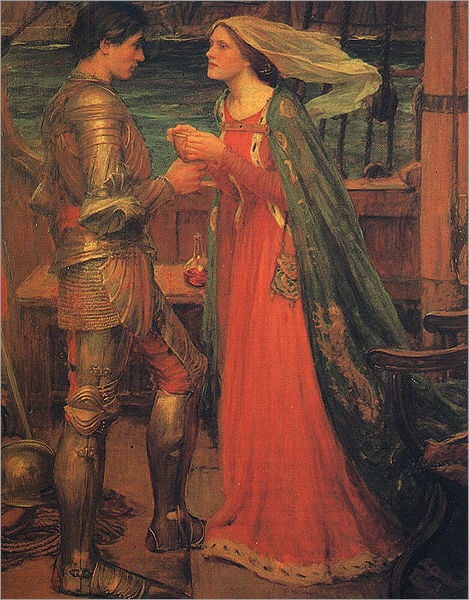
But in daylight the Princess remained unchanged. In daylight Jurgen adored her, but with no feeling of intimacy. Very rarely did occasion serve for them to be actually alone in the day time. Once or twice, though, he kissed her in open sunlight: and then her eyes were melting but wary, and the whole affair was rather flat. She did not repulse him: but she stayed a princess, appreciative of her station, and seemed not at all the invisible person who talked with him at night in the Hall of Judgment.
Presently, by common consent, they began to avoid each other by daylight. Indeed, the time of the Princess was now pre-occupied: for now had come into Glathion a ship with saffron colored sails, and having for its figure-head a dragon that was painted with thirty colors. Such was the ship which brought Messire Merlin Ambrosius and Dame Anaïtis, the Lady of the Lake, with a great retinue, to fetch young Guenevere to London, where she was to be married to King Arthur.
First there was a week of feasting and tourneys and high mirth of every kind. Now the trumpets blared, and upon a scaffolding that was gay with pennons and smart tapestries King Gogyrvan sat nodding and blinking in his brightest raiment, to judge who did the best: and into the field came joyously a press of dukes and earls and barons and many famous knights, to contend for honor and a trumpery chaplet of pearls.
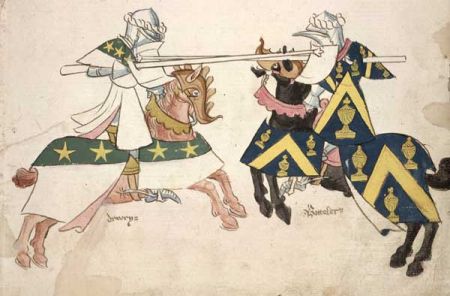
Jurgen shrugged, and honored custom. The Duke of Logreus acquitted himself with credit in the opening tournament, unhorsing Sir Dodinas le Sauvage, Earl Roth of Meliot, Sir Epinogris, and Sir Hector de Maris: then Earl Damas of Listenise smote like a whirlwind, and Jurgen slid contentedly down the tail of his fine horse. His part in the tournament was ended, and he was heartily glad of it. He preferred to contemplate rather than share in such festivities: and he now followed his bent with a most exquisite misery, because he considered that never had any other poet occupied a situation more picturesque.
By day he was the Duke of Logreus, which in itself was a notable advance upon pawnbroking: after nightfall he discounted the peculiar privileges of a king. It was the secrecy, the deluding of everybody, which he especially enjoyed: and in the thought of what a monstrous clever fellow was Jurgen, he almost lost sight of the fact that he was miserable over the impending marriage of the lady he loved.
Once or twice he caught the tail-end of a glance from Gogyrvan’s bright old eye. Jurgen by this time abhorred Gogyrvan, as a person of abominably unjust dealings.
“To take no better care of his own daughter,” Jurgen considered, “is infamous. The man is neglecting his duties as a father, and to do that is not fair.”
Footnotes from Notes on Jurgen (1928), by James P. Cover — with additional comments from the creators of this website; rewritten, in some instances, by HiLoBooks.
* Anaïtis — Anaïtis, or Anahita, was a Persian goddess, and a feminine form, perhaps, of the god Mithra. She was a goddess of fertility and of fertilizing waters; and, according to the Avesta, purified the seed of males and the milk of females, and was invoked by marriageable girls, and by women at the time of childbirth. She is described as a “beautiful maiden, powerful and tall, her girdle fastened high, wrapped in a gold embroidered cloak, wearing earrings, a necklace, and a crown of gold, and adorned with thirty otter skins.” At Erez, in Akilisene, there was a sanctuary which contained a golden statue of the goddess. To this sanctuary, which was famous for its wealth, the daughters of the noble families of Armenia used to go and, as a religious rite, prostitute themselves before their marriage. Anaïtis was also worshiped in Cappadocia and Pontus; and at Zela, in Pontus, a festival in her honor, the Sacæ, was held annually. It is hard to say just what grounds, other than those of expediency, Mr. Cabell has for connecting her with the Lady of the Lake.
* Sir Dodinas le Sauvage — Sir Dodinas is mentioned several times in Le Morte d’Arthur as a knight of King Arthur’s court.
* Earl Roth of Meliot — ?
* Sir Epinogris — In Le Morte d’Arthur, Sir Ipinogris is mentioned as “the king’s son of Northumberland.”
* Sir Hector de Maris — Sir Hector de Maris was the youngest brother of Sir Lancelot, and King Arthur’s foster-father,
* Earl Damas of Listenise — In Le Morte d’Arthur there is a Sir Damas who aided Morgan le Fay in imprisoning Arthur, intending to slay him by treachery.
RADIUM AGE SCIENCE FICTION: “Radium Age” is HILOBROW’s name for the 1904–33 era, which saw the discovery of radioactivity, the revelation that matter itself is constantly in movement — a fitting metaphor for the first decades of the 20th century, during which old scientific, religious, political, and social certainties were shattered. This era also saw the publication of genre-shattering writing by Edgar Rice Burroughs, Sax Rohmer, E.E. “Doc” Smith, Jack London, Arthur Conan Doyle, Aldous Huxley, Olaf Stapledon, Karel Čapek, H.P. Lovecraft, Charlotte Perkins Gilman, Yevgeny Zamyatin, Philip Gordon Wylie, and other pioneers of post-Verne/Wells, pre-Golden Age “science fiction.” More info here.
READ GORGEOUS PAPERBACKS: HiLoBooks has reissued the following 10 obscure but amazing Radium Age science fiction novels in beautiful print editions: Jack London’s The Scarlet Plague, Rudyard Kipling’s With the Night Mail (and “As Easy as A.B.C.”), Arthur Conan Doyle’s The Poison Belt, H. Rider Haggard’s When the World Shook, Edward Shanks’ The People of the Ruins, William Hope Hodgson’s The Night Land, J.D. Beresford’s Goslings, E.V. Odle’s The Clockwork Man, Cicely Hamilton’s Theodore Savage, and Muriel Jaeger’s The Man with Six Senses. For more information, visit the HiLoBooks homepage.
SERIALIZED BY HILOBOOKS: Jack London’s The Scarlet Plague | Rudyard Kipling’s With the Night Mail (and “As Easy as A.B.C.”) | Arthur Conan Doyle’s The Poison Belt | H. Rider Haggard’s When the World Shook | Edward Shanks’ The People of the Ruins | William Hope Hodgson’s The Night Land | J.D. Beresford’s Goslings | E.V. Odle’s The Clockwork Man | Cicely Hamilton’s Theodore Savage | Muriel Jaeger’s The Man With Six Senses | Jack London’s “The Red One” | Philip Francis Nowlan’s Armageddon 2419 A.D. | Homer Eon Flint’s The Devolutionist | W.E.B. DuBois’s “The Comet” | Edgar Rice Burroughs’s The Moon Men | Charlotte Perkins Gilman’s Herland | Sax Rohmer’s “The Zayat Kiss” | Eimar O’Duffy’s King Goshawk and the Birds | Frances Hodgson Burnett’s The Lost Prince | Morley Roberts’s The Fugitives | Helen MacInnes’s The Unconquerable | Geoffrey Household’s Watcher in the Shadows | William Haggard’s The High Wire | Hammond Innes’s Air Bridge | James Branch Cabell’s Jurgen | John Buchan’s “No Man’s Land” | John Russell’s “The Fourth Man” | E.M. Forster’s “The Machine Stops” | John Buchan’s Huntingtower | Arthur Conan Doyle’s When the World Screamed | Victor Bridges’ A Rogue By Compulsion | Jack London’s The Iron Heel | H. De Vere Stacpoole’s The Man Who Lost Himself | P.G. Wodehouse’s Leave It to Psmith | Richard Connell’s “The Most Dangerous Game” | Houdini and Lovecraft’s “Imprisoned with the Pharaohs” | Arthur Conan Doyle’s “The Sussex Vampire.”
ORIGINAL FICTION: HILOBROW has serialized three novels: James Parker’s The Ballad of Cocky The Fox (“a proof-of-concept that serialization can work on the Internet” — The Atlantic); Karinne Keithley Syers’s Linda Linda Linda (which includes original music); and Robert Waldron’s roman à clef The School on the Fens. We also publish original stories and comics. These include: Matthew Battles’s stories “Gita Nova“, “Makes the Man,” “Imago,” “Camera Lucida,” “A Simple Message”, “Children of the Volcano”, “The Gnomon”, “Billable Memories”, “For Provisional Description of Superficial Features”, “The Dogs in the Trees”, “The Sovereignties of Invention”, and “Survivor: The Island of Dr. Moreau”; several of these later appeared in the collection The Sovereignties of Invention | Peggy Nelson’s “Mood Indigo“, “Top Kill Fail“, and “Mercerism” | Annalee Newitz’s “The Great Oxygen Race” | Flourish Klink’s Star Trek fanfic “Conference Comms” | Charlie Mitchell’s “A Fantasy Land” | Charlie Mitchell’s “Sentinels” | Joshua Glenn’s “The Lawless One”, and the mashup story “Zarathustra vs. Swamp Thing” | Adam McGovern and Paolo Leandri’s Idoru Jones comics | John Holbo’s “Sugarplum Squeampunk” | “Another Corporate Death” (1) and “Another Corporate Death” (2) by Mike Fleisch | Kathryn Kuitenbrouwer and Frank Fiorentino’s graphic novel “The Song of Otto” (excerpt) | John Holbo’s graphic novel On Beyond Zarathustra (excerpt) | “Manoj” and “Josh” by Vijay Balakrishnan | “Verge” by Chris Rossi, and his audio novel Low Priority Hero | EPIC WINS: THE ILIAD (1.408-415) by Flourish Klink | EPIC WINS: THE KALEVALA (3.1-278) by James Parker | EPIC WINS: THE ARGONAUTICA (2.815-834) by Joshua Glenn | EPIC WINS: THE MYTH OF THE ELK by Matthew Battles | TROUBLED SUPERHUMAN CONTEST: Charles Pappas, “The Law” | CATASTROPHE CONTEST: Timothy Raymond, “Hem and the Flood” | TELEPATHY CONTEST: Rachel Ellis Adams, “Fatima, Can You Hear Me?” | OIL SPILL CONTEST: A.E. Smith, “Sound Thinking | LITTLE NEMO CAPTION CONTEST: Joe Lyons, “Necronomicon” | SPOOKY-KOOKY CONTEST: Tucker Cummings, “Well Marbled” | INVENT-A-HERO CONTEST: TG Gibbon, “The Firefly” | FANFICTION CONTEST: Lyette Mercier’s “Sex and the Single Superhero”
